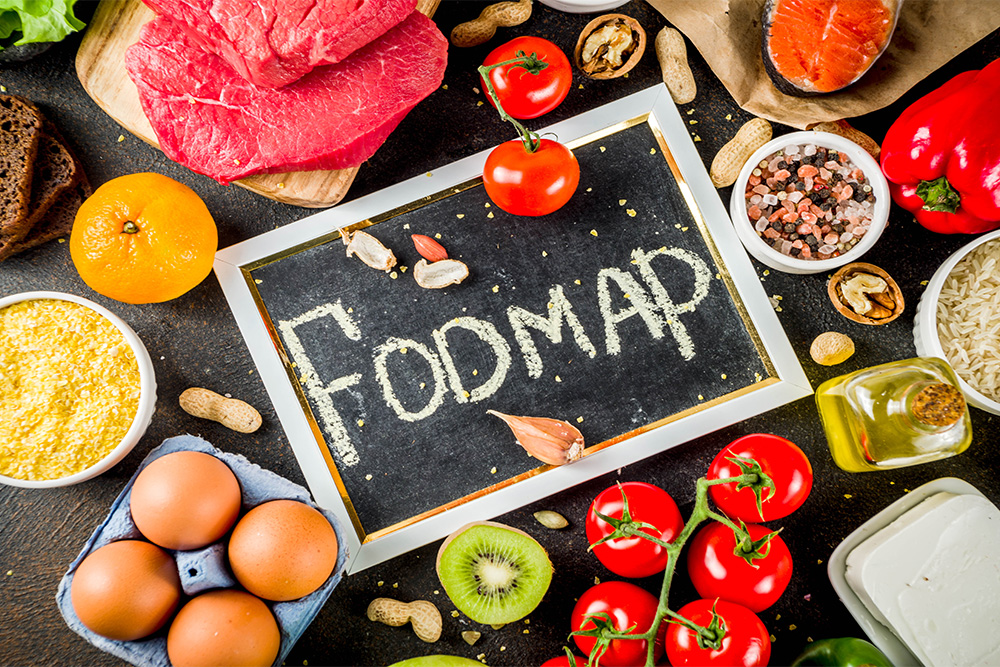
What The Heck Is The Low FODMAP Diet?
According to the Canadian Digestive Health Foundation, it is estimated that 20 million Canadians suffer from some type of digestive issue. Since the Global Pandemic we have seen an increase interest in digestive and immune health. Often gluten is blamed for many digestive symptoms. Celiac disease and gluten intolerance are serious conditions; however, gluten may not be the main trigger in other digestive concerns such as irritable bowel syndrome (IBS). For people with IBS, traditional ingredients like garlic and onions can be challenging to include in their diet. That is where the low FODMAP Diet comes into play. Not sure what it is? Let’s explore what the heck is the low FODMAP Diet.
What is the low FODMAP Diet?
Over the past decade, nutrition science research has supported the low FODMAP diet for individuals with IBS to improve symptoms. The low FODMAP diet was founded by researchers at Monash University in Australia in 2008. What does FODMAP stand for? It is an acronym for Fermentable Oligosaccharides including fructans, Disaccharides including lactose, Monosaccharides including fructose and Polyols including sorbitol, mannitol, maltitol, xylitol and isomalt. These are short-chain carbohydrates that are resistant to digestion.
 How does it work?
How does it work?
The mechanisms behind gastrointestinal distress caused by FODMAPS is that these ingredients/foods are not absorbed properly within the proximal small intestine and instead reside in the gut and are fermented creating hydrogen gas instead of methane. In addition, to hydrogen gas production their small size makes them osmotic, drawing fluid into the intestine, resulting in loose bowel movements. FODMAPs overall cause gastrointestinal distress leading to many symptoms such as pain, bloating, nausea, and irregular bowels. There is a breath test people can take to determine if they would be suited to the FODMAP diet, call the hydrogen breath test. Some of the benefits of the low FODMAP diet include relief of abdominal pain, gas, bloating, and diarrhea.
A small study with 27 participants (14 that were re-evaluated) with IBS demonstrated that when FODMAPS are avoided for eight weeks that 13 out of 14 had improvements in bloating, 11 out of 12 had decreased flatulence, 10 out of 13 a decreased bowel urgency, and 10 out of 12 had abdominal pain (1). A 4-week study conducted on 92 IBS participants demonstrated that there is a decrease in serum 7C4 levels with the introduction of a low FODMAP diet (2). 7C4 levels are associated with hepatic bile acid production, and bile acid malabsorption and elevated levels of hepatic bile acid and resulting in high levels of serum 7C4 have been associated with IBS (2). Participants in the study with a decrease in serum 7C4 related to the low FODMAP diet had improved abdominal pain.
 Final Thoughts
Final Thoughts
Remember no single dietary pattern is a silver bullet for everyone. It is necessary to seek out a qualified health professional, like a dietitian, to support your digestive health goals and to confirm the low FODMAP diet will be beneficial for your specific digestive symptoms. A lifestyle filled with healthy habits including a balanced dietary pattern, exercise and restful sleep is the best approach for long-term consistent, mind-body health.
Jane and her team would be pleased to assist your company in the better-for-you space and/or speak at your upcoming events including podcasts and webinars!
Click here to contact Jane.
References:
- O’Meara C, Craig OF, Mahmud N, McKiernan S, Maccarthy F. A PILOT STUDY ON THE INTRODUCTION OF A LOW FODMAP DIET IN A SUBGROUP OF SYMPTOMATIC IBS PATIENTS REFERRED BY THE GASTROENTEROLOGY SERVICE IN AN IRISH TERTIARY REFERRAL CENTRE. Gut [Internet]. 2013 Aug 8 [cited 2019 Oct 8];62(Suppl 2): A3.2-A4.
- Eswaran SL, Selvaraj FM, Princen F, Tooker P, Harvie G, Chey WD. Serum 7C4 Levels Decrease after low Fodmap Diet in IBS Patients: A Potential Mechanism for Benefit. Gastroenterology [Internet]. 2017 Apr [cited 2019 Oct 8];152(5): S160.
